
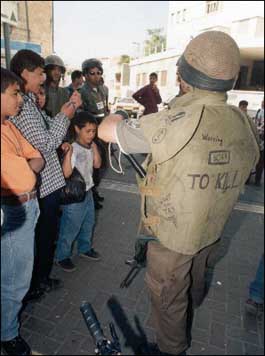
 
|
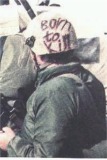 |
|
|
10 May 2002 |
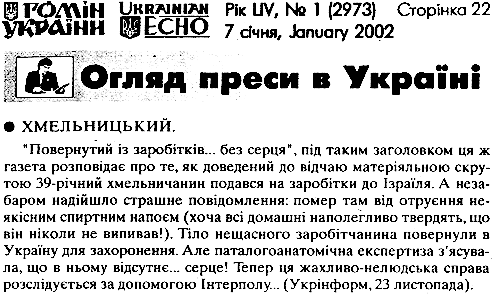
|
UKRAINIAN ECHO 07 January 2002 Page 22 A view of the press in Ukraine "Returned from foreign labor ... without his heart." Underneath such a headline, this newspaper relates that, reduced to despair by extreme material straits, a 39-year-old Khmelnytsky resident took a job in Israel. However, the terrible news shortly arrived that he had died there of poisoning by a tainted alcoholic beverage (even though all domestic sources insist that he never drank!). The body of the unfortunate worker was returned to Ukraine for burial. However, medical experts discovered that he was missing ... his heart! At the moment, this dreadfully-inhuman affair is being investigated with the help of Interpol.... (Ukrinform, 23 November). |
|
Moreover, [Jerusalem District Court Judge Ruth] Orr was well within her rights to be skeptical of the pathological findings of [government pathologist Dr. Yehuda] Hiss, who has long been the subject of controversy as director of Israel Institute for Forensic Medicine, at Abu Kabir. Last November, a local Tel Aviv paper Ha'ir ran a 12-page expose of Abu Kabir and revealed how the national lab allows medical students to practice on bodies sent there for autopsies, and transfers body parts for transplants without permission from the family of the deceased. The family of Alastair Sinclair, a Scottish tourist who hanged himself in an Israeli jail, was forced to bring suit for the return of missing body parts. University of Glasgow pathologists who did an autopsy at the request of Sinclair's family, found that it had been returned without a heart (which they suspect was used for a transplant) and without the crucial bone needed to confirm the claim that he died from hanging. Jonathan Rosenblum, Presumed Guilty, Dei'ah veDibur, 07-Feb-2001, originally published in the Jerusalem Post, currently available at www.shemayisrael.com/chareidi/archives5761/beshalach/features.htm |
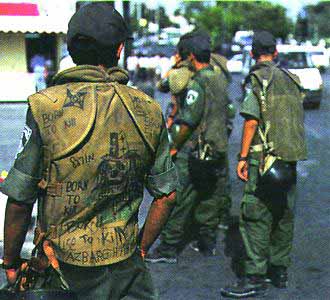 |
|
|
Israel Kills Palestinian Boys,
Steals Organs For Transplants Teheran Times.com 1-9-2 AL-KHALIL (IRNA) � The Zionist state has tacitly admitted that doctors at the Israeli forensic institute at Abu Kabir had extracted the vital organs of three Palestinian teenage children killed by the Israeli Army nearly ten days ago. Zionist Minister of Health Nessim Dahhan said in response to a question by Arab member of the Zionist Parliament 'Knesset', Ahmed Teibi, on Tuesday that he couldn't deny that organs of Palestinian youths and children killed by the Israeli forces were taken out for transplants or scientific research. "I couldn't say for sure that something like that (taking out the organs) didn't happen." Teibi said he had received credible evidence proving that Israeli doctors at the forensic institute extracted such vital organs as the heart, kidneys, and liver from the bodies of Palestinian youths and children killed by the Israeli Army in Gaza and the West Bank. The Israeli authorities normally detain the bodies of martyred Palestinians for a few days without any explanation. The Israeli Army on December 30 killed three Palestinian boys, aged 14-15 near Khan Younis in unclear circumstances. The army issued conflicting reports on the killing, while Palestinian sources charged that Israeli troops murdered the three unarmed boys in cold blood. The bodies of the three boys were handed over to the Palestinians for burial on 6 January. However, shortly before burial, Palestinian medical authorities examined the bodies and found out that the main vital organs were missing from the bodies. The Israeli media have nearly completely ignored the affair. (IRNA) Reproduced on the Jeff Rense web site at www.rense.com/general19/israelkills.htm |
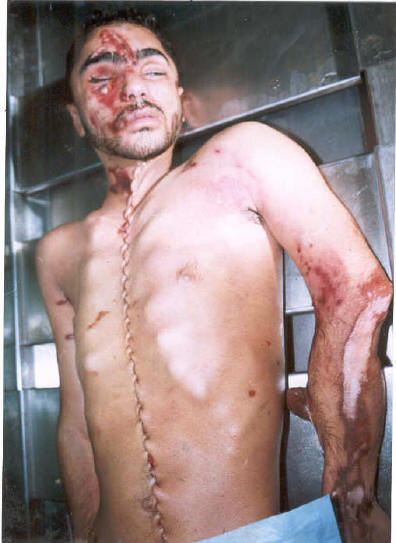
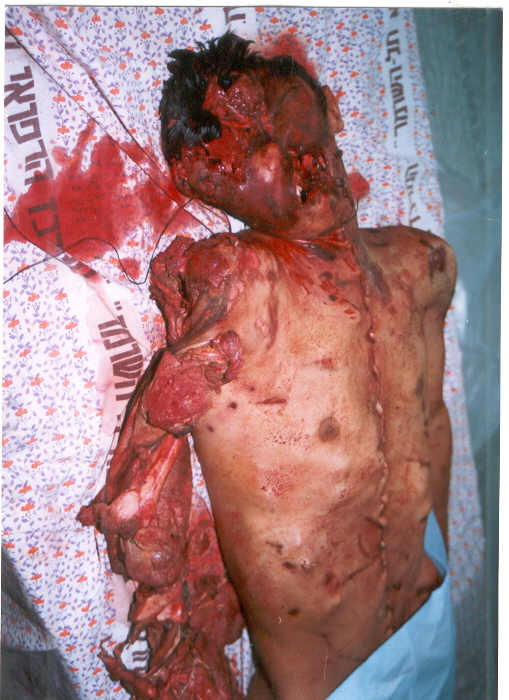
|
Interestingly, the Israeli Anatomy and Pathology Law (1953) allows for "using part of a corpse when it is needed to save the life of a person" without any consent. This law has very rarely been used and on one celebrated occasion may have brought more damage than benefit. On June 19, 1993, a heart, liver, lungs, and kidneys were harvested from an anonymous traffic accident victim in Beersheba and transplanted in five patients in Israel. After all attempts to identify the family failed, the hospital staff harvested the organs without consent. This person was not carrying a donor card. The story was described on the front pages of the daily newspapers as a case of "organ robbery," and public response was so unfavorable that no similar attempts have been made since.
Ethical Issues in Organ Transplantation in Israel by Gershon B. Grunfeld, Ph.D., Bruce Rappaport Faculty of Medicine, Technion-Israel Institute of Technology, P.O.B. 9649, 31096 Haifa, ISRAEL, on University of Tsukuba web site at www.biol.tsukuba.ac.jp/~macer/EJ66/EJ66O.html |
 |
|
|
During the first ten months of the year, 26 donors contributed to 91 recipients. The donors included traffic-accident fatalities, operating-room deaths, and seven-year-old Ali Jawarish of Bethlehem, accidentally shot by IDF soldiers during riots outside Rachel�s Tomb. He was pronounced brain-dead on Nov. 15; his organs were transplanted into three Israeli-Arab teenagers the next day. Nearly half the donors during the first six months of 1997 were gastarbeiter whose families overseas gave their consent by telephone � sometimes in return for Health Ministry funding to fly the corpse home.
Organ Transplants and Donations, ISRAEL YEARBOOK and ALMANAC, 1998 www.iyba.co.il/98/organs.htm |
|
Israel has recently become something of a pariah in the transplant world. Without a strong culture of organ donation and under the pressure of angry transplant candidates, the Ministry of Health has refused to crack down on the country�s multi-million dollar business in transplant tourism that arranges junkets from dialysis clinics in Jerusalem and Tel Aviv to medical centres in Europe and the United States. "Why should we Israelis be made to travel to third world clinics to get the kidneys we need to survive from the bodies of peasants, soldiers, or guest workers who may be in worse physical shape than ourselves?" a 71-year-old "kidney buyer" from Tel Aviv asked me rhetorically. "Organs should be seen as a human, not as a national resource." It was good to see "Avirham," an elderly gentleman, alive and happy with his revitalizing 22-year-old "peasant" kidney. And his living donor? "A peasant, without anything!" he replied. "Do you have any idea what $1,000, let alone $5,000 means in the life of a peasant?" For most bio-ethicists, the "slippery slope" in transplant medicine begins with the emergence of a black market in organs and tissue sales. For the anthropologist, it emerges much earlier: the first time a frail and ailing human looks at another living person and realizes that inside that other body is something that can prolong his or her life. The desire is articulated: "I want that; I need that even more than you." In terms of transplants, the kidney has emerged as the ultimate fetish, promising to satisfy the most basic of human desires � that for life, vitality and élan. The sale of human organs and tissues requires that certain disadvantaged individuals and populations have been reduced to the role of "suppliers." It is a scenario in which bodies are dismembered, transported, processed and sold in the interests of a more socially advantaged population of organ and tissue receivers. I use the word "fetish" advisedly to conjure up the displaced magical energy that is invested in the strangely animate kidney. Avirham, who flew from Jerusalem to Georgia for his kidney, explained why he would never tolerate a donation from a corpse: "That kidney is practically dead. It was probably pinned down under the wheels of a car for several hours... I was able to see my donor. He was young, healthy, strong. Just what I was hoping for." Nancy Scheper-Hughes, The Organ of Last Resort, UNESCO, The Courier, July/August 2001 www.unesco.org/courier/2001_07/uk/doss34.htm |
|
Ugur Dündar, Haluk Sahin, and M. Ali Önel of Kanal D's
ARENA, Hürriyet Production, Turkey
�The International Transplant Mafia,� broadcast in two installments in 1997, exposed a human organ black-market network linking Turkey, the Czech Republic, and Israel. An Istanbul man, struggling to raise two young children, had agreed to sell one of his kidneys for $8,000 U.S. dollars but later contacted Arena, Turkey's lead investigative TV program, fearing that more than a kidney might be lost. An Arena reporter with a hidden camera,
1998 International Consortium of Investigative Journalists (ICIJ) Award Finalists www.icij.org/about/finalists.html |
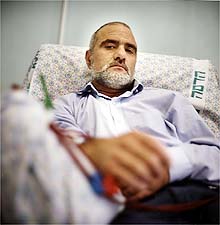 Organ Buyer Moshe Tati |
|
Moshe was 43 years old, and he was dying, and not one of his family members was a suitable match for a kidney donation. So he called the broker. Moshe lives in Israel, which happens to be one of the more active nations in the international organ-trafficking market. The market, which is completely illegal, is so complex and well organized that a single transaction often crosses three continents: a broker from Los Angeles, say, matches an Italian with kidney failure to a seller in Jordan, for surgery in Istanbul. [...] The sale of human organs, whether from a living person or a cadaver, is against the law in virtually every country (Iran is perhaps the only exception) and has been condemned by all of the world's medical associations. [...] Yet in Israel and a handful of other nations, including India, Turkey, China, Russia and Iraq, organ sales are conducted with only a scant nod toward secrecy. In Israel, there is even tacit government acceptance of the practice � the national health-insurance program covers part, and sometimes all, of the cost of brokered transplants. [...] Paying for an organ has become so routine in Israel that there have been instances in which a patient has elected not to accept the offer of a kidney donation from a well-matched relative. "Why risk harm to a family member?" one patient told me. Instead, these patients have decided that purchasing a kidney from someone they've never met � in almost all cases someone who is impoverished and living in a foreign land � is a far more palatable option. I can get you a kidney immediately," said the broker whom Moshe Tati called. "All I need is the money." Then he quoted a price: $145,000, cash, paid in advance. [...] Desire for a living donor is another reason why dialysis patients often prefer to purchase a kidney and circumvent national programs, where legally transplanted organs are almost always from cadavers. An Israeli kidney buyer named Avriham, who used the same broker as Moshe Tati and traveled to Eastern Europe, described this notion in his own terms: "Why should I wait years just to have a kidney from someone who was in a car accident, pinned in his car for hours, then in miserable condition in the I.C.U. for days, and only then, after all that trauma, have part of him put inside me? That organ is not going to be any good! Or, worse, I could get the organ of an elderly person, a person who died of a stroke or an aneurysm � that kidney is all used up! It's better to take a kidney from a healthy young man who can also benefit from the money. Where I went, families were so poor they didn't even have bread to eat. The money I gave was a gift equal to the gift I received. I insisted on seeing my donor. He was young and very healthy, very strong. It was perfect, just what I was hoping for. A dream kidney." [...] When Moshe's plane landed in Istanbul, there was no need to clear customs, no one asking for passports. "Everything was already taken care of," Moshe says. "The organization was like clockwork." Moshe and the other three patients were driven to a hospital � An old hospital," Moshe says, "not modern, but very clean" � and their family and friends were taken to a hotel. [...] "As I was being prepared for surgery," Moshe says, "I saw the man who was giving me his kidney. I just glimpsed him briefly. He was in an operating room across from me. We never spoke; when I saw him, he was already asleep, at the beginning of his surgery. [...] Scheper-Hughes remains unconvinced that selling a kidney is actually a low-risk activity. She says she feels that the chief tenet of the Hippocratic Oath � do no harm � is being violated. "In these deals you are certainly harming someone else," she says. "You are harming the sellers." The argument that the slight harm to the sellers is more than offset by the lifesaving potential on the other end of the transaction is also troubling to Scheper-Hughes. "I call this 'increasing the net good,'" she says. "Is this really the kind of world we want to live in � one based on utilitarian ethics in which net gain to one relatively privileged population allows them to claim property rights over the bodies of the disadvantaged?" Further, she points out, every study demonstrating that kidney donation does not compromise health has been conducted in a wealthy nation. "It is not exactly clear that poor people can really live safely with one kidney," she says. People who sell their kidneys, she adds, usually live in abject conditions and face greater-than-average threats to their health, including poor diets, low-quality drinking water and increased risk of infectious disease, all of which can easily compromise the remaining kidney. The actual kidney-removal surgery may also not be as gentle as advertised. Even Michael Friedlaender admits that removal surgery is a more painful procedure than transplantation. After a surgeon has carved through skin, fat and several layers of muscle, getting at a kidney sometimes necessitates the partial extraction of the 12th rib. Short-term complications have been documented in nearly one in five kidney-donation surgeries. [...] There is further concern about the notion that sellers are making an autonomous choice. Lawrence Cohen, an associate professor of medical anthropology at Berkeley and the other founder of Organs Watch, has done much of his fieldwork in India. He recently studied 30 kidney sellers in the city of Chennai. Twenty-seven of them were women. Some of their husbands, Cohen learned, made it clear that if the men had to do heavy labor, it was only fair that the women contribute to the family income by selling a kidney. Cohen observed that in none of the cases did selling an organ significantly improve the family's fortunes in the long run. "If only I had three kidneys," one of the women told Cohen, "then I could sell two and things might be better." "Nobody seems concerned about the sellers," Scheper-Hughes says. "The buyers are supported by doctors, but no one represents the sellers. Nobody solicits their opinions. In this market, they have become an invisible population. Someone needs to listen to them. What do they have to say?" [...] The surgery lasted a little less than three hours. "When I woke up I had severe pain in my right side," Mehmet recalls. "I told the doctor about the pain and he gave me a shot. [...] Mehmet, meanwhile, has never regained his health. It has been four years since the operation. "I'm not the same person," he says. "I swell up like a pregnant woman. I can't sleep. I have not been able to work; my health has not allowed it. [...] The people of this village, they look down on me because of what I've done. I feel helpless." An American surgeon, after being told of Mehmet's symptoms, suggested that Mehmet might suffer either from nerve-entrapment syndrome � in which a nerve was mistakenly caught in one of his internal sutures � or a type of hernia that can result if one of the layers of abdominal muscle the surgeon sliced through did not heal properly. Mehmet has not gone to see a doctor about his pain. He can't. All of the money from the operation is gone. Mehmet's wife is the family's sole wage earner. [...] "Everything is worse now than before," Sebnem says. "Mehmet was a healthy person, and now he is like this. Nothing is right. [...] We've basically been reduced to begging." Michael Finkel, This Little Kidney Went to Market, New York Times Magazine, 27-May-2001 www.artsci.wustl.edu/~anderson/introethics/NYTimes_Organ_buying.htm |
|
MOLDOVA/TURKEY/ISRAEL � ORGAN TRADE Reporter: Sue Lloyd Roberts (BBC) LEAD STORY EPISODE 5 SERIES 11 - 01-Aug-2001 Synopsis: The Moldovan village of Minghia has the dubious distinction of being the world's best source of human kidneys. At least 14 young men from the village have sold one of their kidneys in an extensive trade across three countries. In an extraordinary investigation the BBC's Sue Lloyd Roberts even discovers one case of a young engineer who had his kidney stolen. Lured to Istanbul on the promise of work, he was told the job had evaporated but he could earn his return fare by selling blood. When he woke from the anaesthetic he had a major scar and an empty feeling in his left side. He was told he could either accept the $3000 for his kidney (the going rate for Moldovan kidneys) or find his own way out of the predicament. In Turkey, Sue discovers that the surgeon responsible for the illegal trade is well known to the authorities, having been repeatedly exposed on Turkish TV, but seems to be continuing his trade with impunity. Most of the recipients of the kidneys are Israelis because of the very low level of [organ] donations there. From the health authorities in Israel we learn that the practice is now so widespread that insurance companies, subsidised by the Government, are funding these illegal transplants. It's a shocking indictment of the ways supply and demand can distort the law and ethics. For poor Moldovan villagers $3,000 may be their only chance of a reasonable future, for Israelis on dialysis $60,000 is a cheap price to get back their lives. Meanwhile fortunes are being made by agents, middlemen and surgeons feeding this demand. The organ trade is illegal in all three countries but the police and health authorities are either unwilling or unable to combat the pressures of these disturbing market realities. Australia Broadcasting Corporation Online, 01-Aug-2001 www.abc.net.au/foreign/2001/ep5-11.htm |
|
HEALTH: Israeli Link In Estonian 'Human Kidneys For Sale' Scam By Andrei Ivanov MOSCOW, Feb 20 (IPS) � The commercial trade in human body parts is no longer confined to the poorer developing countries, it seems � Eastern and Central Europe is now becoming a source of cheap human kidneys and other organs for the booming transplant industry. Investigations are continuing in Tallinn following revelations in January that two Israeli doctors performed kidney transplants on six Israeli nationals in Tallinn using kidneys donated from natives of Romania, Moldova and Russia. The surgery was organised in Estonia because transplantation of organs is legally prohibited in Israel without a special permission of the health minister unless the donor is a relative of the patient. The Israeli surgeons said the donors had given their kidneys voluntarily and free of charge. However Estonian police have launched criminal proceedings against the
surgeons, the patients and the donors on the grounds that they concealed the aim
of their visit in their visa applications. [...] Andrus Maesalu, head doctor at Tallinn's Central Hospital where the operations were carried out, says they were performed in Estonia because the hospital service is cheaper. He said the Israelis had told doctors at the hospital the donors were relatives of the recipients. However, the same newspaper quoted one of the donors, a 37-year- old resident of Kingissepp, Russia, as saying he was not a relative of any of the recipients. [...] According to Israel's Ha'aretz newspaper, however, each kidney operation cost the patient 150,000 dollars. Chaim Efraima, an adviser with the Priaso sponsorship company which organised the kidney transplant operations, says his company charged 160,000 dollars for each operation. [...] Israeli Public Health Ministry statistics show that number of Israelis waiting for kidneys is increasing, while the number of kidney transplant operations has remained relatively small. In 1995 only 21 percent of patients needing a kidney received one and this
fell to 15 percent in 1996. At present there are 900 persons on the list of
patients waiting for a kidney transplant operation in Israel and the list is
growing longer every day. [...] The prices for organs taken from live patients run about 4,425 dollars for a cornea, 55 dollars for a patch of skin, and 1,000-2,000 dollars for a kidney, according to researchers into the trade. Inter Press Service www.oneworld.org/ips2/feb98/transplants.html |
|
In all, the organ stealing rumor has its basis in poor peoples' perceptions, grounded in a social and bio-medical reality, that their bodies and those of their children might be worth more dead than alive to the rich and the powerful. They can all too easily imagine that their bodies, and the bodies of their young children, may be eyed longingly by those with money. As they envision it, organ exchange proceeds from the bodies of the young, the poor and the beautiful to the bodies of the old, the rich, and the ugly, and from the poor in the South to the rich in the North: Americans, Germans, Italians, Japanese and Israelis in particular. [...] Finally, the child and organ stealing rumor reflects unscrupulous practices of international adoption. In the shantytowns of Brazil I encountered several cases of coerced adoption and (in 1990 alone) two cases of child stealing by wealthy "patrons." Each year nearly 1,500 children leave Brazil, legally, to live with adoptive parents in Europe, the United States, and Israel. But if one adds the clandestine traffic in babies that relies on false documents and bureaucratic corruption in Brazil and abroad, exploiting the ignorance and the powerlessness of poor women, the number of children leaving Brazil has been estimated at 3,000 a year, or roughly 50 babies a week. The lively market in "spare babies" for international adoption is often confused with the lively market in "spare parts" for international transplant surgery. As poor people in shantytowns see it, the ring of organ exchange proceeds from the bodies of the young, the poor, and the beautiful to the bodies of the old, the rich, and the ugly, and from poor nations in the South to rich nations in the North. In the midst of the black market for organs and babies, poor people can hardly be blamed for thinking that their babies are wanted as much dead and for their organs as for their lives. [...] Between 1985-1990 about 2,000 children have entered Israel from Brazil in a questionable manner. Nancy Scheper-Hughes sunsite.berkeley.edu/biotech/organswatch/pages/theftoflife2.html (footnote numbers removed) |
|
Romania probes Israeli adoption agency link in organ trafficking By Ran Reznick Romanian authorities are looking into possible links between Israeli adoption agencies and an illegal global conspiracy to sell organs for transplants. The Romanian Embassy in Israel has asked for, and received from the Labor and Social Affairs Ministry, a list of all children born in Romania who have been brought to Israel for adoption in recent years. The Romanian officials are trying to ascertain if all such children arrived in Israel with all organs in their bodies. [...] Responding to complaints and rumors, Romanian authorities have taken the highly unusual step in the past year of withholding authorization for the adoption of 16 Romanian babies destined for Israeli parents. This delay has been enforced although the Israeli couples have paid $20,000 each to adopt the infants, and have already become acquainted with the babies in the foster homes and institutions where they are being held. Romanian authorities insist they will not give the go ahead for the adoptions until inquiries about possible wrong-doing are completed. Ha'aretz, 12-Dec-2001 www.haaretz.co.il/hasen/pages/ShArt.jhtml?itemNo=105107&sw;=Romania |
|
Although the issue of the missing Yemenite and other Jewish children is well known in Israel, I understand that it is virtually unknown abroad. This issue involves thousands of children who were taken, sometimes forcably, from their biological parents while in hospitals or childcare homes, then sold both in Israel and abroad for substantial sums (that varied from case to case), or given out for adoption, while their parents were told that the children had died. In most cases, when the parents asked about the cause of death or requested a death certificate or other documentation confirming the death of their children, they were ignored and their requests went unanswered. They never saw a body. In most cases, not even a burial spot was seen. In a few cases, however, graves were shown to the families. Some of those graves, later on, were dug up by parents who did not believe that their beloved, healthy child truly died overnight. The graves were found empty. These activities were carried out by doctors, nurses, social workers and other members of the Israeli Establishment at that time. I have heard many "moral" justifications given for taking these children from their parents. I do not believe any are legitimate. It seems to me that the real reason for the kidnapping of the children was money. People in positions of power at the time that the State of Israel was established profited from the abduction and sale of children from poor immigrant families. This practice continued on at least into the early 1960s. Some say that it still continues, although on a much smaller scale. One common misconception is that these abuses were practiced against Yemenite Jews alone. While researching this issue I have concluded that the victims also included immigrant Jews from Tunis, Spain, Morocco, Lybia, Iraq, Iran, and Belgium, to name a few countries. In most cases, the immigrants came from Middle Eastern countries. The number of kidnapped children has been estimated at around 2,400 by the official investigating committee. When Rabbi Uzi Meshullam was still collecting evidence, he gathered the names of 4,500 children. I believe that the real number is much larger than that. I have found that many families never reported the disappearance of a child. I estimate that approximately 10,000 children were kidnapped and sold, and I would not be surprised if the real number is higher. Yechiel A. Mann, Research Associate of Israel Resource News Agency, The Case of the Missing Children: Discovering the Fate of Thousands of Jewish Children Who Disappeared in Israel Between 1948 and 1954, Israel Resource Review, 02-Jun-1998 israelbehindthenews.com/Archives/Jun-02.html |
|
"One day, I arrived to nurse my daughter and they told me: 'You can't nurse her today. She has pneumonia'. I was very surprised, since the child was completely healthy, but they said she needs to be sent to the Pardes Hannah Hospital, for three days. I told them I will go consult my husband and will be right back. We lived about five meters away from the baby ward. Three minutes later, I arrived, with my husband, but they told us: 'They already took her'. Three days later, a man arrived, announcing that Masha Hovera had died. My husband asked that they bury her. They told him: 'You are her father? She has died. Sign here'. He said: 'I'm not signing. I want to see a body and bury it'. They told him: 'They buried her yesterday, along with another five children'. My husband was in shock. He asked: 'Are we in Israel or in Germany'? He asked and begged to see the grave, and they did not let him. He said: 'I am not signing, nor mourning'. Every day, I would go to the manager's office, and beg that they show me where my daughter was buried. A few days later, the manager told me: 'Go, there is a room downstairs, they will give you your child, but do not touch her. She will be given to you, wrapped up, and you return her to the grave'. I went, and saw a strange package, that didn't look like a dead child to me. I felt I was being fooled. I said to myself, I'll open it, maybe it's a dead cat. I removed a rag, and another rag, until I reached the last one, and found nothing. Only rags. I started to cry: 'Why did you give me rags?', the manager told me: 'We wanted to calm you down, we didn't know you were so smart'...." To this very day, they do not know of their child's fate. Yechiel A. Mann, Research Associate of Israel Resource News Agency, The Case of the Missing Children: Discovering the Fate of Thousands of Jewish Children Who Disappeared in Israel Between 1948 and 1954, Israel Resource Review, 02-Jun-1998 israelbehindthenews.com/Archives/mann2.htm |
|
[Ami] Chovav was interviewed concerning the allegations that were current then, that medical experiments were conducted on Yemenite children hospitalized during the 1950s. [...] One of the reasons claimed by Chovav that a body was never seen and a grave site was not specified in many of the cases is, to quote, "... The child that died would be sent to the institute of pathology. Many were sent. It was for a humanitarian cause, for advancing medical research. I do not see anything wrong with that at all." When he was asked about permission from the family to do such a thing, he answered "In many of the cases, they did not know who the child belonged to, or where it came from. When there was a family, they didn't want to show it the body. "Once the autopsy was completed, the body would be completely dismembered. Were they supposed to show that to a religious parent? The refrigeration compartment would eventually fill up, and then they called the Chevera Kadisha to come and bury all the body parts." He added, regarding the pathological institute not telling the parents anything, "I asked them. They said it wasn't their job, it was the hospital's job. But the hospital did not always know who the child belonged to...." One example of a reason for this that was given by Chovav: "In one case, the children were taken in the ambulance in cardboard boxes, since they weren't going to put babies on stretchers. On that specific trip, they put notes with the children's names on top of the boxes. The wind blew all the notes away. That is how the children were brought to the hospital." Yechiel A. Mann, Research Associate of Israel Resource News Agency, The Case of the Missing Children: Discovering the Fate of Thousands of Jewish Children Who Disappeared in Israel Between 1948 and 1954, Israel Resource Review, 02-Jun-1998 israelbehindthenews.com/Archives/mann2.htm |
 |
|
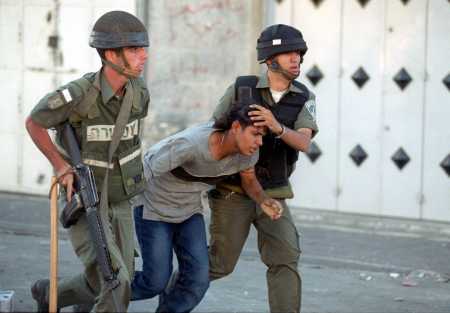 |
|
|
In 1994 Rabbi [Yehoshua] Sheinberger [...] met with senior physicians from the Israel Transplants Association and discussed with them the Jewish religious prohibition on organ donations. In Israel Haredi Jews refuse organ transplants from their and/or their relatives' corpses. On this issue the Haredi position influences many people for superstitious as well as religious reasons. Organ transplants in Israel are thus difficult to arrange. Surgeons frequently request Haredi rabbis to appeal to their followers to agree to organ transplants from corpses of their relatives in order to save lives. The surgeons' argument is based upon the Jewish religious law giving priority to saving Jewish lives. In this discussion Rabbi Sheinberger put the condition that only a Haredi rabbi could authorize such transplants. He explained: "Jewish religious law states that it is forbidden to transplant Jewish organs into either non-Jews or Jews who are not pious. It is obvious that it is prohibited under any circumstances to transplant Jewish organs into Arabs, all of whom hate Jews." Rabbi Sheinberger, when asked for his definition of a Jew who is not pious, replied that a rabbi must determine the status of every Jew. Sheinberger's request caused a huge commotion and was rejected. Many non-Haredi rabbis allow an organ of a non-Jew to be transplanted into a body of a Jew in order to save the life of the Jew. They, however, oppose the transplant of an organ from a Jew into the body of a non-Jew. Some important rabbis go much further in discussing and ruling about differences between Jews and non-Jews on medical matters. Rabbi Yitzhak Ginsburgh, an influential member of the Habad movement and the head of a yeshiva near Nablus [...] opined in an April 26, 1996 Jewish Week article, reproduced in Haaretz that same day: "If every single cell in a Jewish body entails divinity, and is thus part of God, then every strand of DNA is a part of God. Therefore, something is special about Jewish DNA." Rabbi Ginsburgh drew two conclusions from this statement: "If a Jew needs a liver, can he take the liver of an innocent non-Jew to save him? The Torah would probably permit that. Jewish life has an infinite value. There is something more holy and unique about Jewish life than about non-Jewish life." It is noteworthy that Rabbi Ginsburgh is one of the authors of a book lauding Baruch Goldstein, the Patriarch's Cave murderer. In that book Ginsburgh contributed a chapter in which he wrote that a Jew's killing non-Jews does not constitute murder according to the Jewish religion and that killing of innocent Arabs for reasons of revenge is a Jewish virtue. No influential Israeli rabbi has publicly opposed Ginsburgh's statements; most Israeli politicians have remained silent; some Israeli politicians have openly supported him. Israel Shahak and Norton Mezvinsky, Jewish Fundamentalism in Israel, Pluto Press, London and Sterling Virginia, 1999, pp. 42-43 (blue emphasis added). |
Kidney trade probe moves to Israel Pretorian News at www.pretorianews.co.za/index.php?fSectionId=665&fArticleId;=2415995 |